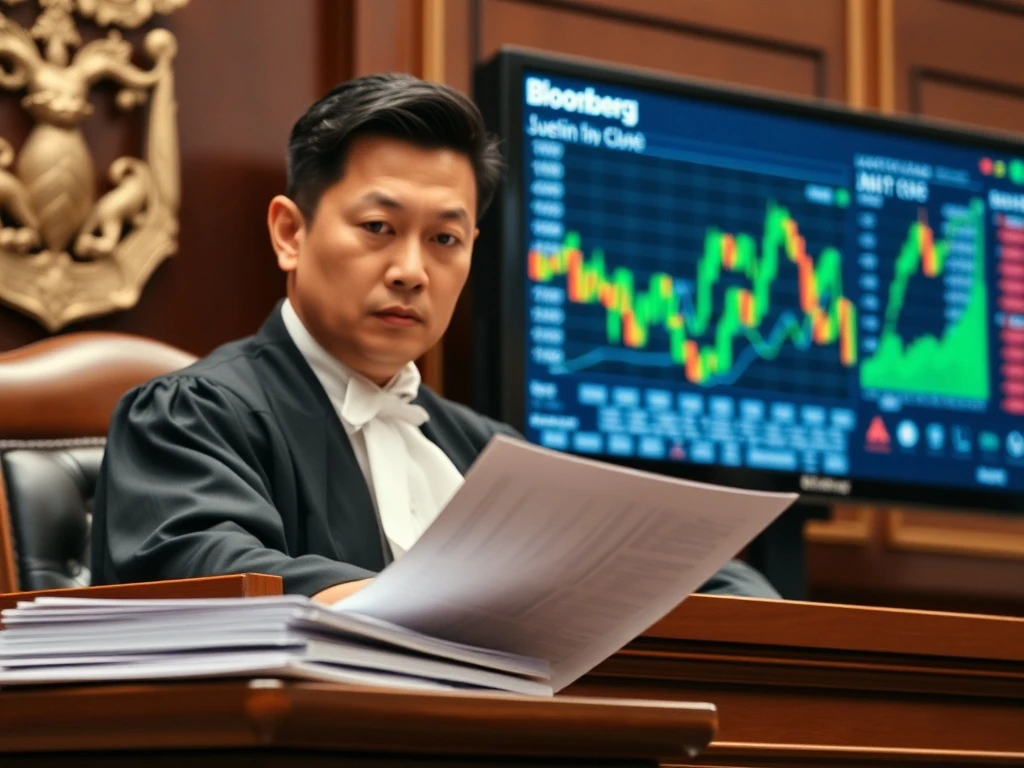Justin Sun’s Crucial Bid to Block Bloomberg Denied Over Crypto Holdings

The digital asset world is currently buzzing with news of a significant court decision. A U.S. judge recently delivered a considerable setback to **Tron founder** Justin Sun. The court denied his attempt to block Bloomberg from publishing details of his extensive **crypto holdings**. This ruling, therefore, highlights critical aspects of transparency versus privacy in the digital asset space. It also underscores the evolving challenges high-profile figures face regarding their financial data.
Justin Sun’s Attempt to Silence Bloomberg Fails
On Monday, U.S. District Court Judge Colm Connolly decisively sided with Bloomberg. He rejected Sun’s motions for both a temporary restraining order and an injunction. These actions, moreover, aimed to prevent the publication from revealing his **digital asset holdings**. The legal battle initially began when Bloomberg sought information for its renowned Billionaires Index.
Bloomberg had initially contacted Sun’s team in February. They sought to gather data on the **Tron founder’s** substantial wealth. Sun, however, promptly claimed Bloomberg intended to publish “unverified, confidential, and private” financial details. Consequently, he filed a complaint on August 11, seeking judicial relief. His lawyers later renewed the motion on September 11, following initial discussions regarding the matter.
Unveiling Significant Crypto Holdings
Court filings ultimately disclosed the specific amounts of cryptocurrency in question. As of February, Sun’s reported **crypto holdings** were indeed substantial. They included approximately:
- 60 billion Tron (TRX)
- 17,000 Bitcoin (BTC)
- 224,000 Ether (ETH)
- 700 million Tether (USDt)
These figures paint a clear picture of Sun’s significant stake in the crypto market. The publication of such data can, admittedly, raise privacy concerns for individuals. However, the judge’s decision weighed heavily on other crucial factors. This notably included the public’s right to information and Sun’s own past actions regarding transparency. (Source: Bloomberg’s Billionaire Index)
Judge’s Rationale: Prior Disclosures Undermine Privacy Claims
Judge Connolly outlined two pivotal reasons for his denial. Primarily, Sun failed to establish that Bloomberg had explicitly promised to keep the data publicly unavailable. Thus, the court found no demonstrable breach of confidentiality. The absence of a formal agreement proved critical to the judge’s decision.
Secondly, Sun could not convincingly demonstrate that publishing his **crypto holdings** would genuinely increase his personal risk. He cited fears of “hacking, phishing, social engineering, kidnapping, or bodily injury.” Nevertheless, the judge pointed to Sun’s own extensive public disclosures. Sun had frequently shared highly specific details about his crypto assets on social media platforms. This pattern of behavior significantly impacted his current legal standing.
Judge Connolly specifically stated, “Sun’s own highly detailed disclosure of his Bitcoin assets undercuts his representation that he is now under threat because Bloomberg published estimates of his cryptocurrency holdings.” He further added, “Sun himself has disclosed far more specific information about his Bitcoin holdings than what Bloomberg published.” This history of self-disclosure effectively weakened his privacy claims in court.
Beyond Bloomberg Lawsuit: Ongoing SEC Scrutiny and Congressional Questions
This legal setback is certainly not the sole challenge confronting **Justin Sun**. The **Tron founder** indeed remains under close scrutiny from U.S. lawmakers and regulators. In 2023, the U.S. Securities and Exchange Commission (SEC) filed a lawsuit against Sun and his associated companies. The lawsuit alleged the offering of unregistered securities, a serious charge within the crypto sector.
The SEC’s case, interestingly, saw a temporary pause. This occurred after former SEC Chair Gary Gensler departed and former President Donald Trump took office. However, recent developments have reignited significant interest in this unresolved matter. The timing and circumstances surrounding the stay have drawn attention.
Last week, two members of Congress raised pointed questions with the SEC. They sought clear answers regarding the commission’s decision to pause its case against Sun. These lawmakers suggested a potential influence. They pointed to Sun’s “sizable investments” in various crypto ventures. These ventures are reportedly controlled by Trump and his family, including World Liberty Financial and a Trump-linked memecoin. The implications of such alleged connections could be profound for regulatory enforcement and public trust.
The Future of Transparency in Digital Asset Holdings
The outcome of the **Bloomberg lawsuit** has broader implications for the entire crypto industry. It sets a precedent regarding the transparency of high-net-worth individuals’ **digital asset holdings**. While personal privacy is a valid concern, public figures often face different expectations. Their financial dealings can, therefore, draw significant public interest and scrutiny.
The case vividly highlights the ongoing tension between individual privacy rights and journalistic freedom. It also demonstrates the critical importance of consistent behavior. Sun’s past public disclosures played a crucial role in the judge’s reasoning. They effectively undermined his current privacy claims. This ruling ultimately reinforces the idea that what is shared online can carry lasting legal consequences.
It remains unclear if **Justin Sun** will pursue further legal avenues moving forward. A spokesperson for the **Tron founder** had not provided comment at the time of publication. The legal and regulatory challenges facing Sun continue to evolve rapidly. His prominent public profile and extensive **crypto holdings** ensure ongoing attention from both media and regulators. The industry will undoubtedly watch closely for any future developments in these unfolding sagas.








